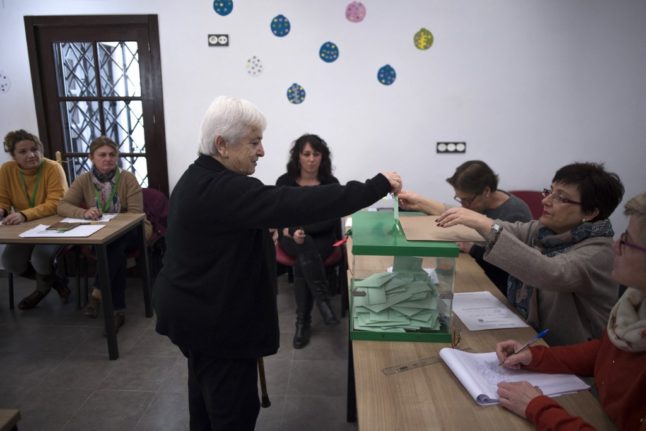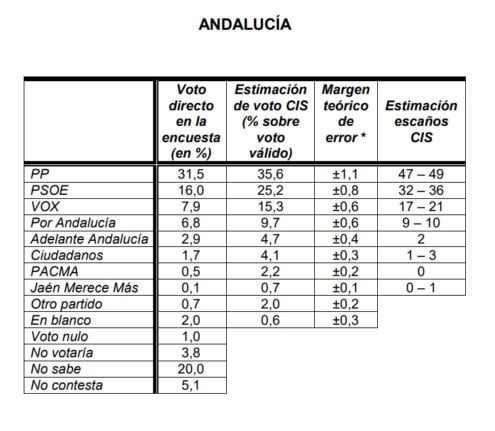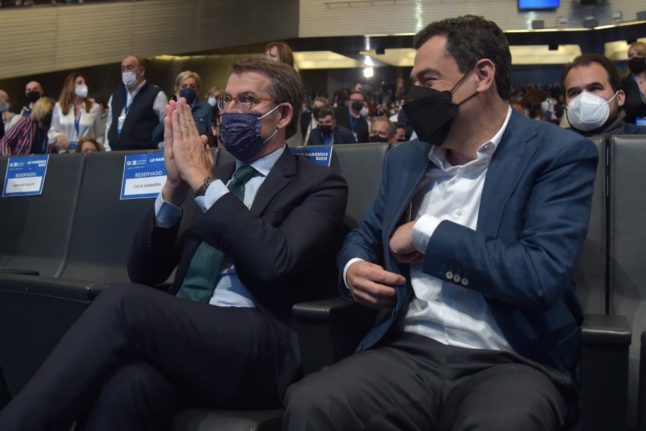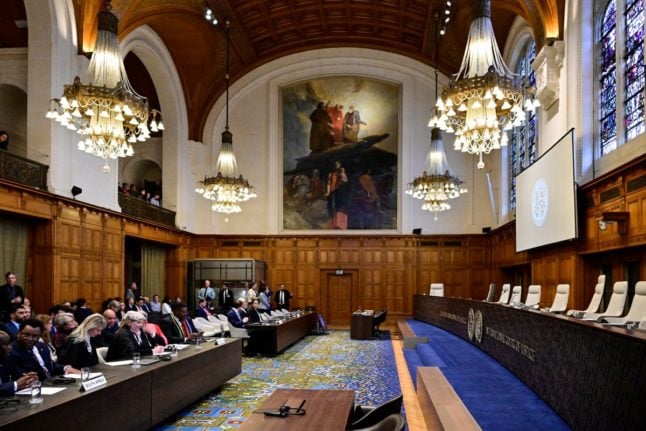After months of rumours about snap elections, on Sunday June 19th, voters across Spain’s southernmost region, Andalusia, will finally head to the polls to elect all 109 seats in their regional parliament.
Andalusia is Spain’s most populous region, with 8.5 million inhabitants, and a place where regional politics has the potential to impact on the national political sphere and was until recently the socialist party PSOE’s traditional stronghold in the south.
At least, that was the case until last time around, when Andaluces delivered a shock result in the 2018 elections.
Breaking with 36 consecutive years of socialist rule, Andalusian voters put an end to PSOE’s political hegemony in the region that had seen them lead the regional executive every year since Spain’s transition from dictatorship to democracy.
READ ALSO: A foreigners’ guide to understanding Spanish politics in five minutes
2018 context
But the truth is that the 2018 election was a little more nuanced than that. Andaluces didn’t suddenly lurch rightwards (though the 2018 election was one of Vox´s first electoral breakthroughs in Spain, winning 11 percent of the vote) but rather southern Spain’s traditionally solid socialist voting block began to disintegrate. Despite forming the government, PP by no means had a strong electoral showing in 2018.
As if often the case in Spain’s more proportional electoral system – one that often spits out coalition or minority governments – PSOE did win the most votes in 2018, but not enough enough to form a government. Parliamentary arithmetic alone, compounded by the emergence of Vox as a fifth party alternative, meant former PSOE regional President Susana Díaz failed to form a coalition.
People’s Party (PP) regional head Manuel Moreno instead formed a coalition with the then politically vibrant centrist Ciudadanos that was reliant political support from Vox.

Changing landscape
With Ciudadanos’ political support crumbling in recent years and Vox withdrawing their support for Moreno’s government over the border crisis in Ceuta in May 2021, Andaluces head to the polls this month in what is quickly becoming a pivotal and unpredictable election with potential political ramifications across the rest of Spain.
Events like the COVID-19 pandemic, war in Ukraine, and political crises between Madrid and Rabat have destabilised governments at both the regional and national level, and June’s election will not only demonstrate what Andaluces think of their first PP-fronted government but, following Vox’s recent entry into the regional parliament in Castilla y León after coming third in elections there, could also prove a litmus test for right-wing coalition forming on the national level as Spain looks ahead to generañ elections in December of 2023.
READ ALSO: Spain’s far-right enters regional government for the first time
Polling
So, what do the polls say?
Opinion polls published on June 2nd by Spain’s Centre of Sociological Studies (CIS) suggests a clear victory for the PP with 35 percent of the votes for Juanma Moreno, 15 percent more than 4 years ago, although 6 to 8 seats short of the 55 seats for a majority in Parliament.
The new PSOE candidate, Juan Espadas, is predicted 25 percent, 3 percent less than in the last elections.
CIS’s survey results also show Vox would obtain 15 percent, Unidas Podemos and Ciudadanos would get 4 percent each, and left-wing coalition Por Andalucía 9 percent.

Another poll from think tank Sigmados in late May 2022 also showed that the PP would win 43 seats with 36.7 percent of the votes, 12 seats more than the PSOE and an increase of 17 on their 2018 result.
Their results also showed that PP would fail to gain the 55 seats needed for a majority in the Andalusian parliament, and Sigmados forecast as well that Vox to be the third-largest party with 14.8 percent of the votes and 17 seats.
READ MORE Which elections can foreigners vote in in Spain?
A Vox government in Andalusia?
If Ciudadanos’ political cratering does continue, it means that Vox would likely step-in as kingmakers in any coalition. Projected to win 17 seats, the parliamentary arithmetic means that a PP-Vox coalition would have more than enough seats for a majority.
After officially entering regional government for the first time in Castilla y León, all eyes will be on Andalusia (and Moreno) to see if PP would accept Vox in a coalition government.
The PP’s new national leader Alberto Núñez Feijóo has reportedly told Moreno to avoid repeating what his counterparts have done in Castilla y León.
If Andalusia, Spain’s most populous region and former PSOE stronghold, elects a regional executive with far-right members, many openly anti-immigrant, anti-LGBT, and anti-Islam, it would be rational to fear such a trend could be transposed from regional governments to La Moncloa and into national government.
PP’s national polling numbers have enjoyed a steady rise since Alberto Núñez Feijóo replaced scandal-ridden Pablo Casado as party leader, and Pedro Sanchez’s PSOE-coalition has had almost its entire time in office swallowed up by pandemic and war.
With the unpredictability of recent years making political predictions difficult, perhaps foolish, all eyes in Spain will be on Andalusia on June 19th.
READ ALSO:



 Please whitelist us to continue reading.
Please whitelist us to continue reading.
Member comments